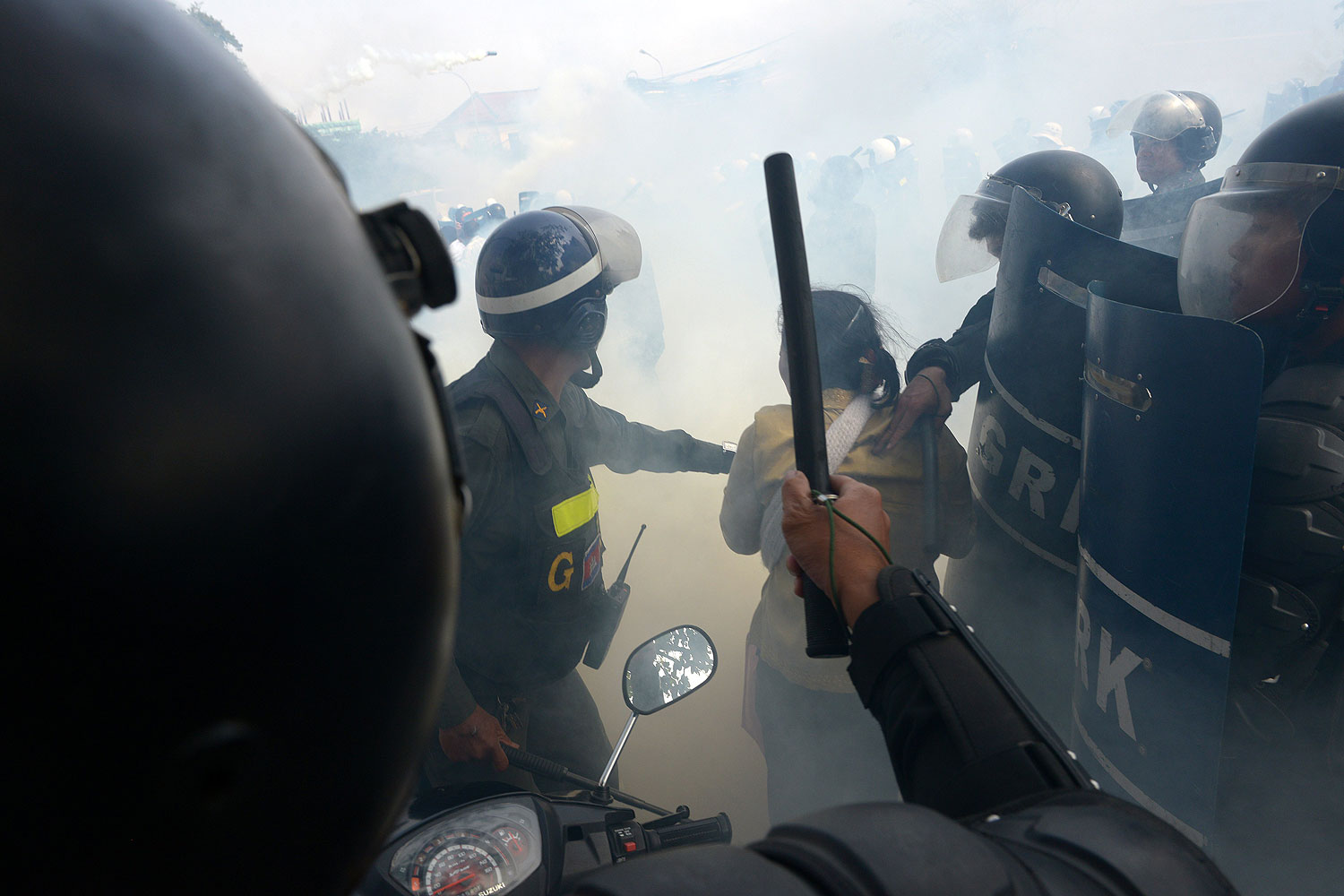
As Thailand teeters on the brink of a full-scale political meltdown, the simmering strife in neighboring Cambodia can be easy to miss. Yet six months after disputed elections, the situation remains grave, featuring the lethal suppression of peaceful protests and extra-judicial detentions.
The government of strongman Prime Minister Hun Sen has endured for some three decades, engorged on rampant corruption and typified by gross human rights abuses. “For far too long, Hun Sen and his colleagues have been getting away with violence, human-rights abuses, corruption, and media and electoral manipulation without serious internal or external challenge,” former Australian foreign minister Gareth Evans wrote in an op-ed yesterday.
Ominously, however, opposition attempts to oust Hun Sen have been increasingly marred by controversy and bloodshed.
Hun Sen’s Cambodian People’s Party (CPP) won 68 out of 123 legislative seats at general elections on July 28. The opposition Cambodia National Rescue Party (CNRP) claims it was defrauded out of eight seats that would have swung the balance of power.
That the deck was stacked is undeniable; all major institutions including the military, police, judiciary, media and even the watchdog National Election Committee operate under the auspices of the CPP. Large numbers of opposition supporters were not included on voter lists.
“There are a lot of very specific systematic and institutional shortcomings in the way elections are administered,” says Laura Thornton, Cambodia director for the National Democratic Institute, who also cites engrained media bias and intimidation. According to a study released Friday by Harvard and Sydney University, Cambodia’s election ranked 69th out of 73 recently held worldwide.
CNRP legislators, buoyed by the return from exile of party leader Sam Rainsy, refused to take their seats, and tens of thousands took to the streets, with sporadic outbreaks of violence last September.
Increasingly, opposition protesters have found common cause with striking workers in the nation’s booming apparel sector—a $5.5 billion industry, yet one in which average monthly wages stand at only $80.
“Unless workers put in pretty outrageous levels of overtime, it in no way constitutes a living wage,” says David Welsh, Cambodia program director for the Solidarity Center labor advocacy group.
Strikers’ demands for a $160 minimum wage have been backed by the CNRP and numbers swelled at fresh protests in January. Official retribution has been harsh, however. A crackdown by security forces on the latest round of protests claimed five lives and saw another 40 demonstrators hospitalized with gunshot wounds. In addition, 21 people, including three leading union leaders, have been incarcerated without due process, and continue to languish in “very harsh conditions” by the Vietnamese border, amid “a broad-based assault on trade union rights,” says Welsh. The government is also using legal harassment: along with almost 200 civil suits filed against six major independent union federations, on Wednesday the Labor Ministry said the constitutional right to freedom of assembly had been suspended.
The possibility of further bloodshed remains high. On Tuesday, Hun Sen lifted a ban on public gatherings imposed immediately after January’s protests, but warned that opposition rallies would be met with rival groups of pro-government supporters. Judging by the bands of regime thugs at previous demonstrations, this “veiled threat” is “irresponsible and could lead to clashes,” Sam Rainsy tells TIME. “Hun Sen is probably afraid of our momentum.”
So what hope is there of a compromise? Negotiations at a “technical level” are ongoing, says Sam Rainsy, and focus on the pivotal issue of reforming the electoral process.
“If they do come to some sort of agreement on these issues, which are very important for the political negotiations, then it could pave the way for those to open again,” says Thornton.
Ou Virak, president of the Cambodia Center for Human Rights, agrees. “The opposition need to negotiate key concessions and then agree to go into parliament,” he says.
Sam Rainsy, though, is holding out for more. Refusing to accept that the July election was legitimate, he insists on a new ballot before the end of the current term in July 2018, pushing for mid-term polls at the start of 2016. “For my party, the sooner the better,” he says.
At the same time, the surge in political unrest has led to a spike in attacks on Vietnamese, who constitute the country’s largest minority but towards whom there is much antipathy. Hun Sen is oft-portrayed as a Vietnamese puppet, and pilloried for granting land concessions to Vietnamese rubber and timber firms. Capitalizing on this, Sam Rainsy has made anti-Vietnamese sentiment an increasingly common element of his rhetoric.
On Feb. 15, a young man of Vietnamese descent, Nguyen Yaing Ngoc, was beaten to death in Phnom Penh’s Meanchey district after a minor traffic infraction. Police say the word “yuon,” a local slur for Vietnamese, was bellowed before the 28-year-old’s lynching at the hands of an enraged mob.
It is a term Sam Rainsy has used repeatedly during his campaign, although he denies inciting race hatred. “We are not against the Vietnamese,” he says. “We are against Hun Sen serving a foreign country’s interest instead of his own.”
Others find it harder to draw a distinction. “Sam Rainsy is a moderate, no doubt, and is also a very smart guy, but he’s not principled,” says Ou Virak. “He’s playing with fire.”
More Must-Reads from TIME
- Inside Elon Musk’s War on Washington
- Meet the 2025 Women of the Year
- The Harsh Truth About Disability Inclusion
- Why Do More Young Adults Have Cancer?
- Colman Domingo Leads With Radical Love
- How to Get Better at Doing Things Alone
- Cecily Strong on Goober the Clown
- Column: The Rise of America’s Broligarchy
Write to Charlie Campbell at charlie.campbell@time.com